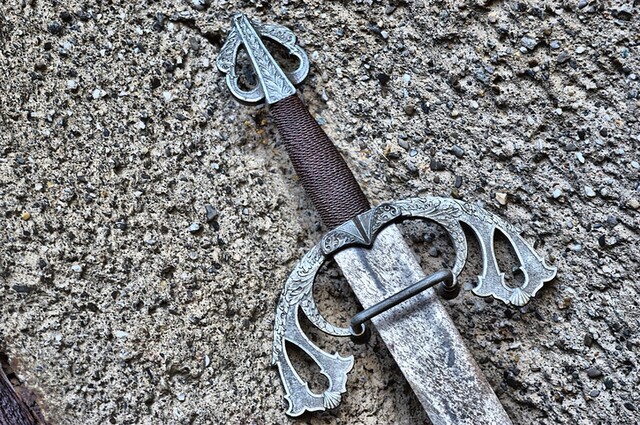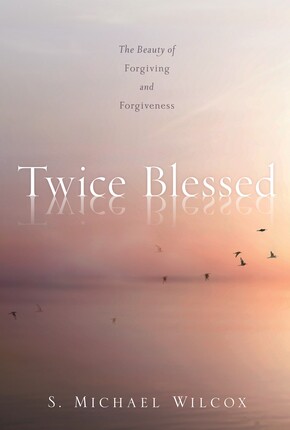Forgiveness can be difficult not only to give but also to receive. Once we have repented, sometimes the only person left to forgive us is ourselves. But as we learn to put away our past sins and do them no more, we can enjoy both the gift of forgiveness from our Heavenly Father and from ourselves.
“Am I in the Place of God?”
I can withhold forgiveness of myself as well as any man. It can be easier at times to forgive others than to turn that same compassion inward. We believe God and Jesus will forgive, but the stain seems to remain. Like the prodigal, we feel we can never be a son again; servant is sufficient. There is humility in the prodigal’s thinking, but a failure to truly understand forgiveness.
We need only return to the brothers of Joseph to understand how enduring guilt over our own behaviors can remain in spite of all assurances from others and from God that the sin has been forgotten. We recall that Joseph had lived in Egypt for 13 years before his life changed for the better, being 17 at the time of his slavery and “30 years old when he stood before Pharaoh” (Genesis 41:46). This was followed by the seven feast years. Sometime in the first or second year of the famine his brothers enter Egypt to buy grain for their families. In time, Jacob is reunited with Joseph and the entire family moves to Egypt. We read that “Jacob lived in the land of Egypt 17 years” before he died (Genesis 47:28). This gives us roughly 37 or 38 years beyond the brothers’ hatred of Joseph that led to his bondage in Egypt. At the death of Jacob, old fears, guilt, and shame resurface. Joseph has lived with his family for 17 years and yet, in spite of his goodness and the beautiful forgiving reunion when he told them who he was, the sting of their past still hurts. “And when Joseph’s brethren saw that their father was dead, they said, Joseph will peradventure hate us, and will certainly requite us all the evil which we did unto him” (Genesis 50:15). That is pure tragedy! They send a messenger to Joseph, telling him, “Thy father did command before he died, saying . . . Forgive, I pray thee now, the trespass of thy brethren, and their sin; for they did unto thee evil: and now, we pray thee, forgive the trespass of the servants of the God of thy father” (Genesis 50:16–17).
The need to forgive was not in Joseph’s heart. He had done that years before, and the intervening time should have been sufficient evidence of his sincerity. The difficulty was in the brothers’ own hearts, and their thoughts became a barrier to receiving the reassurances and love that Joseph wanted to give. When we cannot forgive ourselves, we have a tendency to project that feeling onto the person or persons we have hurt, which just makes the problem more complex because we still believe we must receive another’s forgiveness. In our minds, this takes the power out of our hands, when in reality the relief we desire is ours to welcome.
His brothers’ message troubled Joseph deeply, especially when they fell before him saying, “Behold, we be thy servants.” They are much like the prodigal son who also believed he was no longer worthy of being a son. “And Joseph wept when they spake unto him. . . . And Joseph said unto them, Fear not: for am I in the place of God?” (Genesis 50:17–19; emphasis added). That is a good question for us to ask ourselves when we find it hard to forgive our own actions. We are not in the place of God, and if He forgives—and we have seen how easily He does—then we must trust His wiser view and more compassionate judgment. None of us is a proper judge, even of ourselves. Our own assessment of ourselves is rarely reliable. God will do all the judging, for only He sees with pure eyes. When He has forgiven and others have forgiven, we do not want to appeal their pardon to the court of our own conscience and return the verdict, “Still guilty!” I have done this in my own life often enough to know the tendency well. I assume you have also. Sometimes we accept the forgiveness and are dealing with the sadness that lingers.
All We Can Do
We suffer sometimes from what could be called “wounditis.” The weapon that continues to prick us is an overwrought conscience that can find guilt under every rock, or one that won’t let go. When this happens, I turn to a story I have loved for as long as I can remember, but one I had to learn to apply . . . It is that of the converted Lamanites who take the name “Anti Nephi-Lehies” (see Alma 23:17). Their king gives a most beautiful speech to them as they prepare to face their brothers who have not converted and are preparing to attack them. We all know the decision that is made. They will bury their weapons and never use them again. This is certainly a wonderful story about how to arm ourselves against continuing sin. We try to make it impossible to repeat the offenses by burying the weapons of our past so that in a moment of weakness we will not grab them again. But there is another way of burying the weapons—in this case the ones we use to wound ourselves and keep the sores of our past open and tender. I have used this story over and over again when talking with people who are struggling to forgive themselves.
Notice how the converted Lamanites described themselves! “We were the most lost of all mankind” (Alma 24:11; emphasis added). Now there is a wound that requires the balm of Gilead. They had taken life with those swords they buried. I do not think many of us would describe ourselves, no matter how difficult we find it to forgive our past actions, with that designation. Most lost? We may have done serious things, but are we the most lost of all mankind? How do you deal with that kind of wound? Three times the king says, “It has been all that we could do . . . to get God to take them away from our hearts, for it was all we could do to repent sufficiently before God that he would take away our stain. . . . Oh, how merciful is our God! And now behold, since it has been as much as we could do to get our stains taken away from us, and our swords are made bright, let us hide them away . . . we will bury them deep in the earth” (Alma 24:11, 15–16; emphasis added).
That is the question we must pose to ourselves. “Have we done all we can do?” If the answer is yes (and it is so often when we hold on to the guilt of the past), then let us give Christ His victory. Let us bury the weapons of those former actions that so trouble us instead of holding on to them and using them to continually wound ourselves. I have heard the Spirit ask me many times, “Why do you continue to draw your own sword to your own wounding? Bury it deep in the earth. Let it go.” We have done all we can do, just as the woman who wept at the feet of Jesus and dried His feet with her hair. She had done all she could. If we have given the tears, and the hair, and the kiss, and the ointment, and the love, then let us go in peace, as He bids us. He is the example. Remember, He is the Great Forgetter. Bury your weapons knowing, as the Anti-Nephi-Lehies did, that God “loveth our souls as well as he loveth our children” (Alma 24:14). The people “took their swords, and all the weapons . . . and they did bury them up deep in the earth” (Alma 24:17; emphasis added). That is good advice. Bury all the weapons of the past! Wisdom is always looking forward, applying the lessons from what went before. What do I know now about the fruits on the tree? What has my experience done to my heart and my soul? Am I nearer to God? Have I learned? I believe that even if we learn on the last second of the last minute of the last hour of the last day, the pains and wounds we inflict even upon ourselves will not have been in vain. Nothing learned in mortality is ever too late. And the learning continues certainly beyond the veil.
May I add a final caution? Earlier we examined the parable Jesus told to Simon, a Pharisee, who was distressed that the Lord allowed a woman who had many sins to anoint His feet with ointment. Jesus spoke of two debtors, one who owed five hundred pence and one who owed fifty. Each was duly forgiven, with love the resulting emotion. There are times in my life I can hear the Spirit say to me, “Michael, don’t punish yourself with 500-pence pain for 50 offenses.” We can overemphasize our own mistakes, and though it sounds a bit self-justifying, our own assessment of the seriousness of our follies is not always reliable. Some may have an overheated conscience. We cure this, as we cure so many things, with forgiveness—forgiveness of ourselves. We can often immerse ourselves in greater guilt, shame, and sorrow than the frailty we have manifested warrants. I believe this is also true of our relations within the family and broader humanity. We must be careful that we don’t demand 500-pence apologies, or punishments, or payment, for 50-pence sins. Too many unnecessary stones have been cast by overwrought and misunderstanding consciences about things that common sense should not call sins, though they may be part of the frailties, weaknesses, and communal humanity of God’s children. As the Scottish poet Robert Burns taught, and I am paraphrasing, an honest man has nothing to truly fear in his relationship with God or the coming final accounting, and though he has been the victim or sport of his own instincts, God made those instincts and well knows their power and force better than we do. And what God knows, God will forgive.
Weeds and Rocks
In all things we are asked to emulate our Father and the Savior. What do we know They do with sins when all has been done that can be done? They forget them! They mention them no more! In our desire to be like Them, let us above all things be like Them in this. Let us pray for the grace of God to help us, for forgiveness is always an act of grace and needs grace to reach its fullest liberation. I have read over and over again a letter my wife wrote to me while we were engaged. I turn to it when the weapons of the past continue to wound because I have not buried them deep enough in the earth or when I lay 500-pence anguish upon my 50-pence failures. I had apologized to Laurie for my insensitivity and for hurting her with my negligence during our engagement. She wrote with wisdom beyond her 18 years, and her words have power to soothe my soul even now after her passing. She helped me understand the wonder of self-forgiving. “Please don’t apologize for those few bad moments,” she wrote. “We both learned a lot from them. We still have a lot to learn, but learning is a joy, especially when it is shared. Life won’t always be easy for us, as we both well know. We’ve got a lot of weeds to pull and rocks to throw out of our way yet. But darling, if we stay together through it all and with the Lord guiding our way I know with all my heart that we can stand up to everything. I love you so much for all that you are to me, and for all that you do for me. . . . Please always remember that I love you dearly and need you beside me forever and eternity.” And that is how we forgive ourselves!
Image from Getty Images
For more inspiring insight from S. Michael Wilcox about finding and giving forgiveness, check out Twice Blessed.





